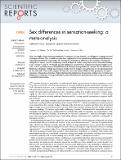Sex differences in sensation-seeking : a meta-analysis
Abstract
Men score higher than women on measures of sensation-seeking, defined as a willingness to engage in novel or intense activities. This sex difference has been explained in terms of evolved psychological mechanisms or culturally transmitted social norms. We investigated whether sex differences in sensation-seeking have changed over recent years by conducting a meta-analysis of studies using Zuckerman's Sensation Seeking Scale, version V (SSS-V). We found that sex differences in total SSS-V scores have remained stable across years, as have sex differences in Disinhibition and Boredom Susceptibility. In contrast, the sex difference in Thrill and Adventure Seeking has declined, possibly due to changes in social norms or out-dated questions on this sub-scale. Our results support the view that men and women differ in their propensity to report sensation-seeking characteristics, while behavioural manifestations of sensation-seeking vary over time. Sex differences in sensation-seeking could reflect genetically influenced predispositions interacting with socially transmitted information.
Citation
Cross , C P , Cyrenne , D-L M & Brown , G R 2013 , ' Sex differences in sensation-seeking : a meta-analysis ' , Scientific Reports , vol. 3 , 2486 . https://doi.org/10.1038/srep02486
Publication
Scientific Reports
Status
Peer reviewed
ISSN
2045-2322Type
Journal article
Collections
Items in the St Andrews Research Repository are protected by copyright, with all rights reserved, unless otherwise indicated.

